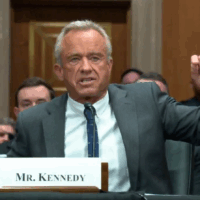For weeks, Kentuckians have seen and heard this message from Kelly Craft, one of the Republican candidates for governor:
“All across Kentucky, an empty chair. A place missing at the table. Families suffering because fentanyl and other dangerous drugs have stolen our loved ones away. As a mother, this is personal to me, because I have experienced that empty chair at my table. This has to stop. We need leadership. And as your governor, I’ll back up our police and stop drugs at our border. So there’s no spot missing at the family table.”
The 30-second television commercial has left some viewers wondering who formerly occupied that empty chair, when, and what happened to them.
In an interview with Mark Vanderhoff of Louisville’s WLKYlast week, Craft declined to identify the person and said the ad refers to “a family member that has had an addiction.” Then, in an impromptu interview, Craft told Ricky Sayer of Lexington’s WLEX that the family member is living.
In a statement Sunday to Kentucky Health News, Craft’s campaign identified the person as “a close family member” who lived in her household, “battled addiction and went to rehab. By the grace of God, that family member was able to overcome the addiction and move on with their life, but we all know the struggle never ends for a family and remains ongoing.”
The statement added, “An empty chair represents a long road of pain, whether caused by the passing of a loved one or years away from the table. It’s insensitive and malicious to think an empty chair implies only death, and shows that those implying such don’t understand the pain caused by the drug epidemic.”
That last line could be taken as a reply to Nick Storm of Kentucky Fried Politics, an online newsletter that said Craft’s explanation that the family member is still living showed that the ad “is hyperbole,” which Webster’s Dictionary defines as “extravagant exaggeration.” The Oxford Languages Dictionary, which Google uses, calls it “exaggerated statements or claims not meant to be taken literally.” The ad makes no specific claim.
Craft, a former ambassador to Canada and the United Nations, told WLKY, “It was very painful at first to be able to open myself up. It’s very emotional. But after traveling throughout the state of Kentucky, my pain is minuscule compared to what I’m hearing and that’s because we have a crisis in this state.”
In 2021, Kentucky documented a record 2,250 drug-overdose deaths, 15 percent more than 2020, which had 54% more than 2019. Toxicology reports showed that fentanyl was involved in 73%, or 1,639. That was 16% more than the 1,413 overdose deaths involving fentanyl in 2020.
“Ambassador Craft is really putting her finger on one of the most important issues in Kentucky,” Kentucky Public Radio Frankfort reporter Ryland Barton told “Kentucky Edition” host Renee Shaw on Jan. 18. “There was some question there, you know, who exactly was she talking about, you know, how close actually is she to this issue?”
That was the central question asked by Kentucky Health News. The written reply from Craft’s campaign began, “As a mother, Kelly knows that the pain caused by the drug epidemic affects almost every family in Kentucky. Kelly has dealt with the chaos addiction causes, first hand. She knows what it means to miss a close family member at the dinner table. Kelly knows the pain that is felt as a family member misses holidays, family dinners, church, school, work, and family events as they confront an addiction ravaging their life.”
In interviews, Craft has criticized Gov. Andy Beshear for not mentioning the drug problem in his State of the Commonwealth speech to the legislature on Jan. 5. Her latest ad says Beshear and President Biden are “ignoring the border crisis,” which she connects with the importation of fentanyl.
Beshear began his weekly press conference Thursday, Jan. 19, by inviting Kentucky communities to apply for “Recovery Ready” certification, which measures their prevention, treatment and recovery support to residents seeking help for drug or alcohol addiction.
Thursday night in London, Craft called drugs the No. 1 issue in Kentucky and possibly in the U.S. That was the first clip from her in Sayer’s three-and-a-half minute report on WLEX, which began by saying that Craft was “choosing to keep private part of a story she made public.”
University of Kentuckypolitical-science professor Stephen Voss told WLEX, “I think most people seeing the ad likely inferred that she’s saying that a family member died, but that’s really sort of on the audience. It doesn’t say that. She says there’s an absent family member. She doesn’t say why they’re absent. The important thing for the electorate is, she’s claiming a special understanding of the policy issue.”
Voss, who was a newspaper reporter in Louisiana before becoming a political scientist, defended the reporters’ questions: “Once a candidate brings a family member into the debate and tries to use them to try to establish some kind of expertise or some kind of competence or understanding of an issue, then it’s hard for election watchers not to demand, ‘Who is this family member? What are you actually saying you experienced with them?'”
Al Cross is professor emeritus of journalism at the University of Kentucky. He was the longest-serving political writer for the Louisville Courier Journal (1989-2004) and national president of the Society of Professional Journalists in 2001-02. He joined the Kentucky Journalism Hall of Fame in 2010. The NKyTribune is the home for his commentary which is also offered to other publications.






